Islamabad, May 1, 2025 – Rising tensions between India and Pakistan have drawn international attention following recent developments in the aftermath of the Pahalgam attack in Indian-administered Kashmir. The government of Pakistan has raised concerns about possible military action by India, while both sides continue to exchange allegations and gunfire along the Line of Control (LoC).
Pakistan Cites Intelligence of Potential Military Action
Information Minister Attaullah Tarar stated early Wednesday that Pakistan had received “credible intelligence” indicating that India may be planning a military operation within the next 24 to 36 hours. This follows India’s decision to grant its military “operational freedom” in response to the April 22 incident in Pahalgam, which left 26 individuals dead.
Tarar said the accusations made by India lacked evidence, and reiterated Pakistan’s position of rejecting “baseless and concocted” allegations. He emphasized Pakistan’s long-standing opposition to terrorism and highlighted its own sacrifices in the global fight against extremism.
“We have always condemned terrorism in all its forms and manifestations,” he added, offering a transparent and independent investigation into the Pahalgam incident through a neutral commission of experts.
Tarar urged the international community to recognize the potential risks of escalation and emphasized that Pakistan remained committed to regional peace, but would respond decisively to any aggression.
Diplomatic Engagements and UN Involvement
Amid rising tensions, Prime Minister Shehbaz Sharif held a phone call with United Nations Secretary-General Antonio Guterres, who expressed concern over the situation and offered the UN’s good offices to support de-escalation efforts.
During the call, the prime minister reiterated Pakistan’s rejection of terrorism, its commitment to peace, and the importance of addressing the Kashmir dispute in line with UN Security Council resolutions. He also raised concerns over India’s actions, including alleged violations of the Indus Waters Treaty and increased military activity across the LoC.
The UN chief stressed the importance of avoiding confrontation, stating that further escalation could have serious consequences for the region and beyond.
Military Activity and Cross-Border Tensions
India’s military has reported repeated exchanges of fire across the LoC, accusing Pakistan of initiating unprovoked firing over five consecutive nights. In response, Indian forces stated they had acted in a “measured and effective” manner. No casualties have been officially reported.
On Tuesday, Pakistan’s state media reported that an Indian drone had been shot down for allegedly violating airspace, although further details were not provided. India has not commented on the claim.
Meanwhile, India has increased domestic security efforts, releasing wanted posters for individuals allegedly linked to the Pahalgam incident, including two Pakistanis and one Indian national. Authorities have also announced rewards for information leading to their arrests.
International Response and Calls for Restraint
International stakeholders, including China, Iran, and Saudi Arabia, have called for calm and urged both countries to seek diplomatic solutions. The United States, through President Donald Trump, stated on Friday that the issue would be “figured out, one way or another,” signaling hope for a peaceful resolution.
The history of conflict over Kashmir continues to strain relations between the two nuclear-armed neighbors, who have fought multiple wars over the region since gaining independence in 1947. The last major flare-up occurred in 2019, following the Pulwama attack, which resulted in retaliatory airstrikes by both countries.
As the situation develops, the global community remains watchful, emphasizing the need for restraint, dialogue, and peaceful conflict resolution.

